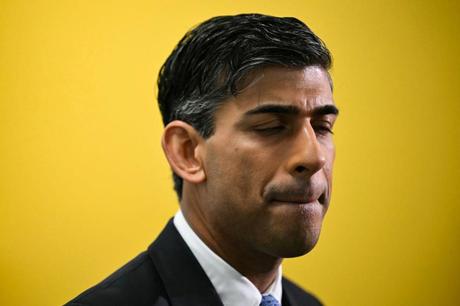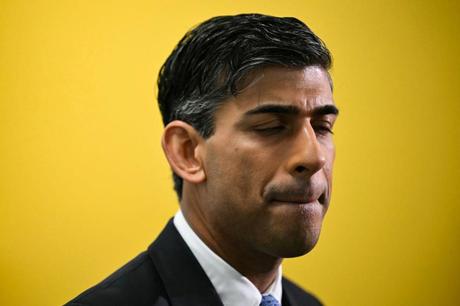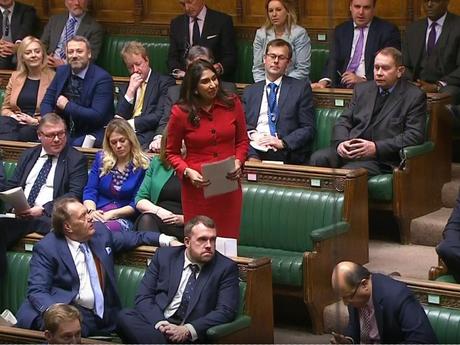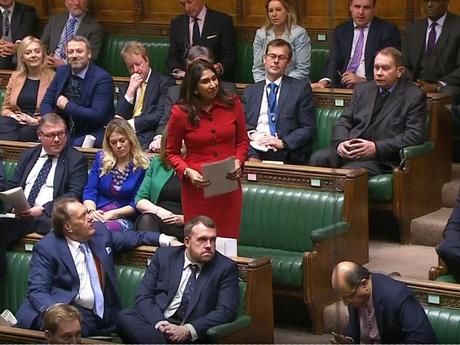Rishi Sunak's premiership has been rocked by the resignation of Immigration Secretary Robert Jenrick, after the prime minister failed to appease right-wing Tories with his emergency legislation in Rwanda.
Home Secretary James Cleverly unveiled a bill in the House of Commons to 'disapply' Britain's Human Rights Act, in a bid to stop British judges from blocking the deportation of asylum seekers.
But the embattled Tory leader has failed to head off a revolt from MPs on the right of the party, who are furious that the Prime Minister has chosen not to opt out of the European Convention on Human Rights (ECHR).
In his scathing resignation letter, Mr Jenrick told Mr Sunak he did not believe the new bill "gives us the best possible chance of success" in getting flights to Rwanda up and running.
The hardliner made it clear he wanted to bypass the ECHR - revealing he was "pushing for the strongest possible" law that would put "national interests above highly contentious interpretations of international law".
Labor said the latest "chaotic chapter" of the Tory battle showed why it was time for a change of power. The Liberal Democrats said Sunak has lost control of the government because another minister is "fleeing this sinking ship".
Mr Sunak now faces the almost impossible task of winning votes, both from the Tory right, who wanted a "full-throated" crackdown on the ECHR, and from moderate MPs in the One Nation group who warn against legislating can support those who violate human rights law. .
Adding to the Prime Minister's woes, sacked Home Secretary Suella Braverman launched a sharp attack on Mr Sunak - warning he faces "electoral oblivion" if he fails to ban Rwanda flights land before the next elections.


The new Sunak Bill includes provisions to disapply relevant parts of the Human Rights Act so that they cannot be included in judicial decisions on deportation cases - but does not seek to disapply the ECHR.
However, the legislation will ensure that British ministers "retain the decision on whether to comply" with interim orders from the European Court of Human Rights - the Strasbourg body that oversees the ECHR.
The story continues
Adding to Mr Sunak's headaches, the Rwandan government immediately responded to the move by warning it could pull out of the deal - if Britain fails to meet "the highest standards of international law" .
The African country's foreign minister, Vincent Biruta, warned: "Without lawful behavior from Britain, Rwanda would not be able to continue with the Migration and Economic Development Partnership."
Mr Sunak defended his plans on Wednesday evening at a showdown of the 1922 Committee of Tory backbenchers - but failed to keep right-wing parties out.
A source close to Ms. Braverman made it clear that the bill does not come close to passing her tests. "It is fatally flawed," the ally said. "It is a further betrayal of Tory voters."


According to ITV, some Tory right-wingers submitted letters of no confidence against Sunak on Wednesday. Right-wing ex-minister Andrea Jenkyns, a staunch Boris Johnson loyalist, said Mr Jenrick's resignation could be "the death blow to Sunak's leadership".
Dozens of hardliners on the right - including members of the 35-strong New Conservatives, the Common Sense Group and the European Research Group - met again on Wednesday evening to decide whether to vote in favor of the new bill.
The independent understands that many of them are not satisfied with the "middle way" option of disapplying the Human Rights Act. One senior MP said the bill makes "no sense" if it fails to thwart the challenges of the ECHR.
The Prime Minister had been warned that he would face an even more damaging uprising - with the possible resignation of up to ten moderate ministers - if he used emergency legislation to circumvent the ECHR.
Senior Tory moderate Damian Green, chairman of the One Nation group - which boasts the support of around 100 MPs - has warned Mr Sunak that he should "think twice before casting aside both the ECHR and the HRA".
A One Nation spokesperson said it welcomes the government's decision to adhere to "international obligations" but is now seeking legal advice on whether it can now support the bill.
The front page of the legislation admits that the government cannot say whether the bill is compatible with the ECHR - an admission that could worry moderates about the mood in parliament in the crucial days ahead.


New Foreign Secretary David Cameron said he was "sorry" that Jenrick had resigned. But he defended the "comprehensive" Rwanda bill, claiming it would "put this policy beyond doubt" and allow flights to resume.
In his exit letter, Jenrick told the Tory leader he refused to be "yet another politician who makes promises on immigration to the British public but fails to deliver."
Home Secretary Laura Farris had first confirmed that Jenrick had resigned after failing to appear in the House of Commons to support the bill. Mr Cleverly then told MPs asking about the resignation: "That has been confirmed."
In another surprise, Ms Braverman gave a formal resignation speech in the House of Commons. She suggested that her own previous 'stop the boats' legislation should have been scrapped in favor of a "more robust alternative that excludes international law and human rights law".
The Tory hardliner also attacked the "extensive human rights laws arising" from the ECHR that stopped flights to Rwanda. Ms. Braverman also said it is "no secret" that she is in favor of leaving the ECHR completely.
Her unusual personal statement to the House of Commons followed her acrimonious departure last month. A similar speech by Geoffrey Howe followed his resignation from the House of Commons in 1990, often credited with ending Margaret Thatcher's political career.
It came despite the government claiming the new bill would "unequivocally exclude the courts from challenging the fact that Rwanda is safe". Mr Sunak insisted his new legislation would ensure his Rwanda plan "cannot be stopped".
Speaking in the House of Commons, Mr Cleverly said the bill was "lawful, fair and necessary". The Home Secretary told MPs that the government was determined to get the emergency legislation passed through parliament quickly. He also denied Labour's claims that Rwanda was getting cold feet because of the "toxicity".
Britain's High Court last month blocked the Rwanda policy over concerns that genuine refugees could be wrongly sent back to their countries of origin where they would face persecution.
Nick Vineall KC, president of the Bar Association, said the new bill is still "likely to trigger legal challenges" over the planned deportations - pointing out that it "reserves the right of the courts to consider whether Rwanda is a is a safe country."
